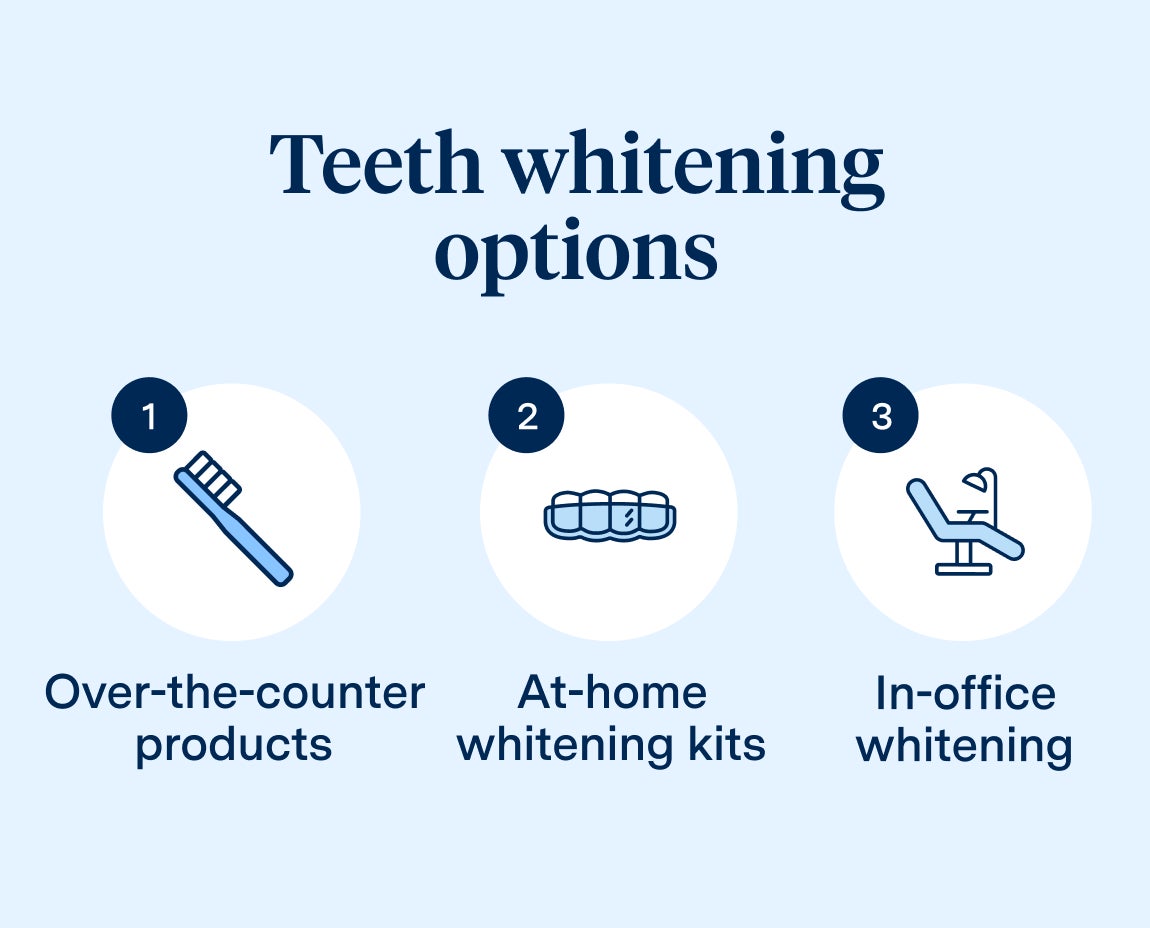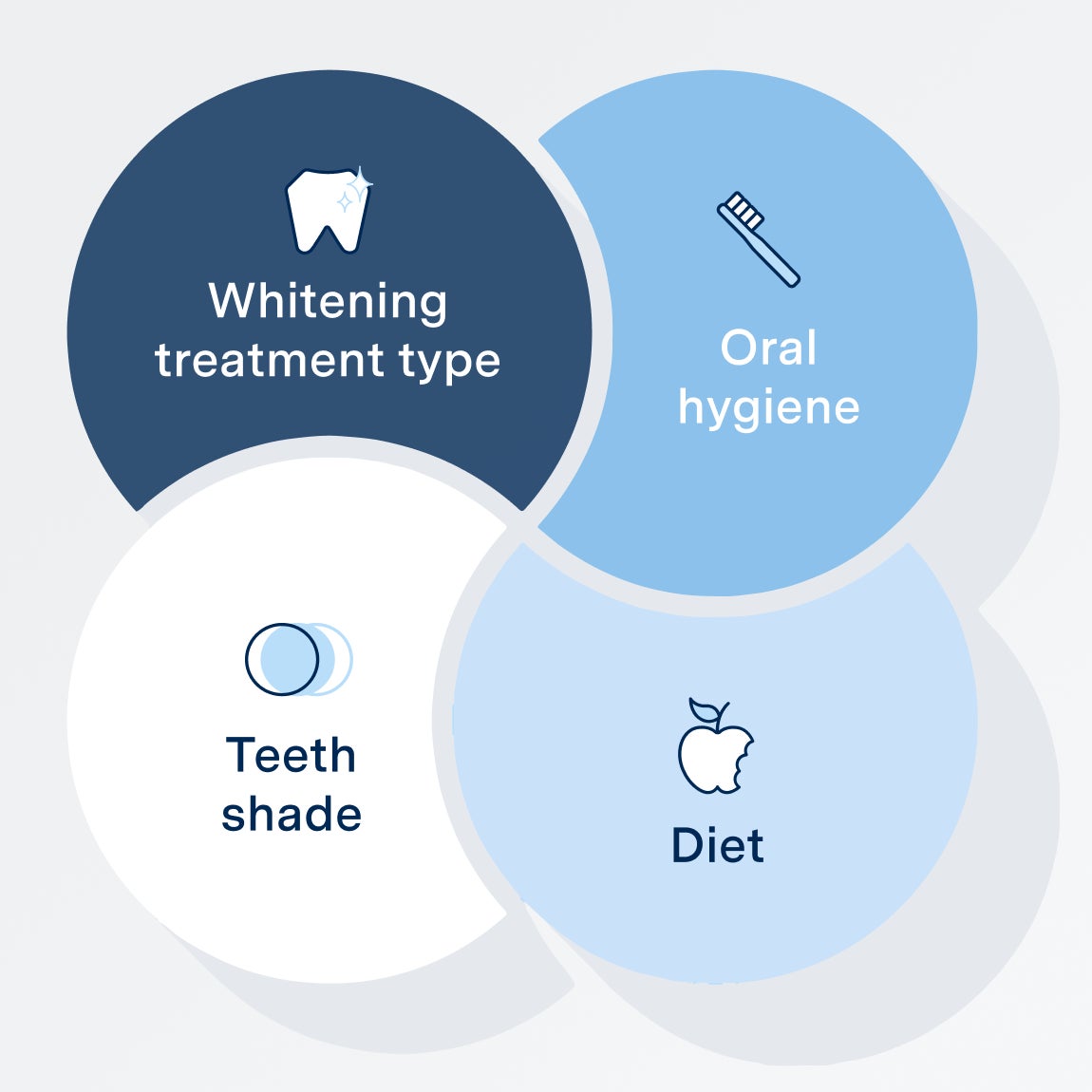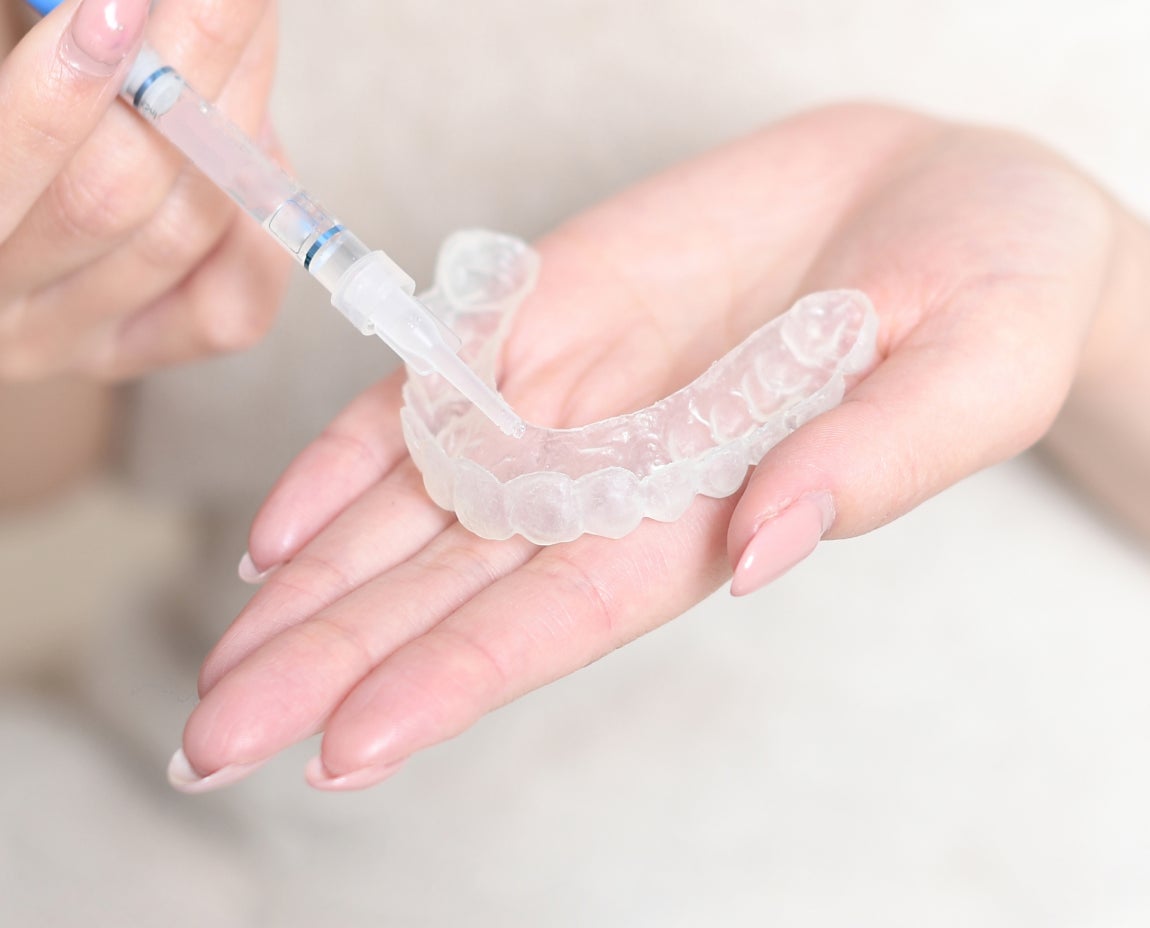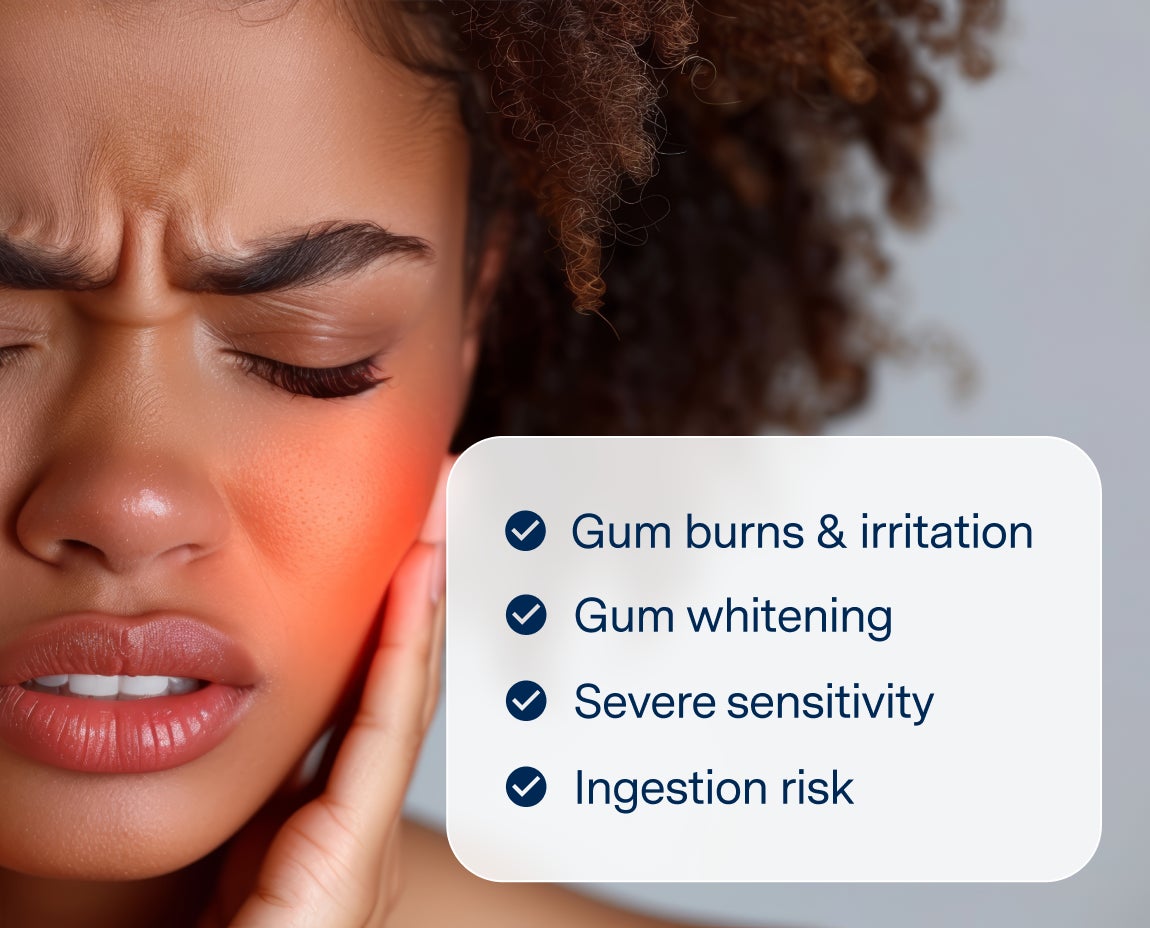Last updated 12.18.2024
How long does teeth whitening last?
Teeth whitening results can last for months; learn key factors that affect their longevity in this blog.

All sorts of factors can dull or stain teeth. Teeth whitening is a popular cosmetic dental procedure to remove this staining and restore a bright white smile. That said, people often ask about how long whitening lasts. There are various types of whitening, and each has an average longevity, but multiple factors involving the patient can affect how long it lasts.
This article explains how long different forms of teeth whitening last and examines several factors impacting the longevity of your teeth whitening procedure. At Aspen Dental, we can assist you with all your teeth whitening needs. If you’re looking to correct discoloration and create a bright, shiny smile, schedule an appointment with us today.
What is teeth whitening?
Over time, teeth can become stained through food and drink, such as coffee, tea, alcohol, and acidic foods. Smoking can stain teeth as well. Teeth whitening works by using bleaching agents, such as hydrogen peroxide or carbamide peroxide, to penetrate the enamel and break down these stains.

Many forms of teeth whitening exist, each offering pros and cons:
Over-the-counter products: Whitening toothpaste and strips offer the lowest cost and convenience but tend to be less effective.
At-home whitening kits: These balance cost and effectiveness, working better than whitening strips and toothpaste and costing less than in-office whitening (which is the more effective solution).
In-office whitening: Professional whitening from a dentist is the most effective solution but costs more and may not be covered by insurance.
Factors affecting the longevity of teeth whitening
Several factors impact the longevity of your teeth whitening treatment:

Whitening treatment type
The primary factor affecting teeth whitening longevity is the whitening type. In-office treatments last the longest because they are performed by cosmetic dentistry professionals with stronger whitening agents that sink deeper into the enamel. Take-home kits can also last long when used correctly, but not necessarily as long as in-office treatments. Whitening strips and toothpaste provide short-term, less dramatic results. They may be suitable if you want to save and just need whiter teeth for a specific occasion.
Oral hygiene
Oral hygiene habits can dramatically impact longevity. Strong oral health keeps bacteria at bay and helps remove stains, prolonging your teeth whitening treatment. Brushing twice daily, as well as flossing and rinsing once daily will preserve your whitening results for longer by keeping your teeth clean. This is especially true if you use whitening oral hygiene products, like whitening toothpaste and mouthwash.
Teeth shade
Whitening treatments may not last as long on teeth that are more severely discolored as teeth with minor stains. Furthermore, multiple whitening sessions may be necessary for darker or more severely stained teeth. It's important to wait 6 months or longer between teeth whitening sessions. Even though these treatments are safe and effective, this will help avoid overexposure.
Diet
Certain foods and drinks can dull whitened teeth and cause discoloration. For example, coffee, tea, and wine can cause this to occur due to certain compounds they contain. Similarly, acidic foods can wear down enamel, increasing the chance of future tooth staining.
Avoiding these foods and drinks can maximize whitening longevity. That said, drinking some of these beverages through a straw may allow you to enjoy them with less staining since the drink bypasses your teeth.
How long does professional teeth whitening last?
As mentioned, the treatment type has the biggest impact on the whitening longevity, as well as your home care and diet. Below, we’ll discuss some average longevities for each form of teeth whitening:

At-home whitening kits
At-home whitening kits tend to show results within two to four weeks¹ and last an average of four to six months.²
¹Source: Healthline. (2023). How long does teeth whitening last?
²Source: Blyss Dental. (2023). How long does teeth whitening last?
Whitening strips
Whitening strips can last up to six months, and sometimes longer, after completing a full cycle.³
³Source: Colgate-Palmolive. (2024). Are teeth whitening strips your best option?
Whitening toothpaste
Whitening toothpaste takes about two to six weeks to see results, which then last for up to three to four months.⁴
⁴Source: Healthline. (2023). How long does teeth whitening last?

In-office teeth whitening
In-office teeth whitening can provide lasting results for one to three years on average.⁵ You can make them last longer by following good oral hygiene, abstaining from smoking, and reducing consumption of certain foods. Either way, this solution can work well for people who want a deeper, longer-lasting result and the peace of mind of professional dental work.
⁵Source: Healthline. (2023). How long does teeth whitening last?
Side effects of teeth whitening
Since the chemicals in teeth whitening agents are designed to break up the particles that cause staining and discoloration, they may irritate your teeth and gums. They can also temporarily increase teeth sensitivity. However, these effects are generally not cause for concern, nor do they last long. That said, serious side effects can occur with any dental procedure. Here are some potential risks of whitening:

Gum burns and irritation: If the laser or bleaching agent contacts the gums, it may irritate or even burn the tissue. However, these may heal within a few days.
Gum whitening: The whitening agent can whiten the gums if overexposure occurs. However, this often fades within a few hours to a few days.
Severe sensitivity: Severe sensitivity may occur since the bleaching agent could wear through some of the enamel.
Ingestion of the agent: There is a risk of accidentally ingesting the agent when handling it on your own. Small amounts may cause nausea, irritation, or discomfort. That's why in-office treatment is often recommended as a teeth whitening solution. If a large amount of the agent is ingested, get medical attention immediately.
Maintaining your white smile
After restoring a beautiful, bright smile with teeth whitening, your part of the job begins. Taking great care of your teeth will help the whitening treatment last as long as possible. Here are some ways to maintain your bright white smile:
Maintain oral hygiene habits: Brush twice daily, floss once daily, and use mouthwash once daily. Consider using whitening oral hygiene products periodically, such as whitening toothpaste or mouthwash.
Avoid tobacco: Smoking, chewing tobacco, and other forms of tobacco can stain and discolor teeth and reduce the longevity and effectiveness of whitening treatments.
Limit specific food and drinks: Minimize acidic foods and dark berries. Reduce consumption of coffee, tea, and wine. Consider drinking these through a straw to reduce their contact with teeth.
Stay hydrated: Hydration helps your mouth produce saliva to wash away bacteria, food particles, and other staining agents.
Visit your dentist regularly: Routine cleanings help remove debris that can cause stains. The dentist also polishes your teeth during your cleanings to keep them bright and white. Schedule an appointment with Aspen Dental today if you're due for a dental cleaning.

Tooth whitening FAQs
Why are my teeth discolored?
Several things can discolor teeth:
Genetic conditions/health history
Poor oral hygiene
Acidic foods
Certain drinks (coffee, tea, and wine)
Smoking or tobacco use
How white can you make your teeth?
The degree to which you can whiten your teeth depends on the treatment method and your teeth’s current color. More heavily stained teeth may be able to be whitened to the same degree as lightly stained teeth. Similarly, at-home products tend to offer less whitening capability than in-office treatments.
Do teeth turn yellow again after teeth whitening?
Yes, teeth can turn yellow again after whitening since these treatments don’t last forever. Consuming coffee, tea, wine, and acidic foods can reintroduce staining. Poor oral hygiene habits and tobacco use will as well. Good oral health maintenance is key to maximizing the lifespan of your teeth whitening.
How much does teeth whitening cost?
The cost of teeth whitening varies by type, such as in-office treatments or take-home teeth whitening kits. Insurance doesn’t usually cover teeth whitening since it’s purely cosmetic. Insurance generally covers procedures containing medically necessary components, like root canals or dental implants.
Teeth whitening is a cosmetic dental solution that can help brighten your smile. Many forms of this treatment exist, from whitening strips and toothpaste to in-office whitening. Results can last from several months to a few years, depending on which type of treatment you decide is right for your needs and budget. Book an appointment with Aspen Dental today if you’re ready to correct discoloration and enhance the appearance of your teeth.



